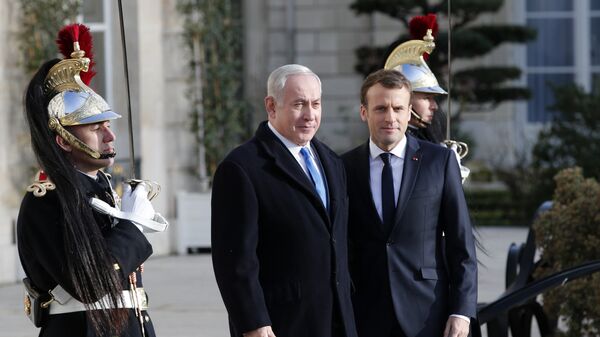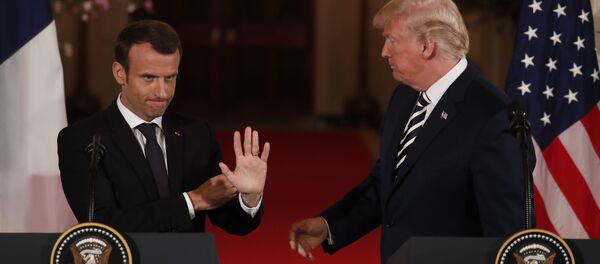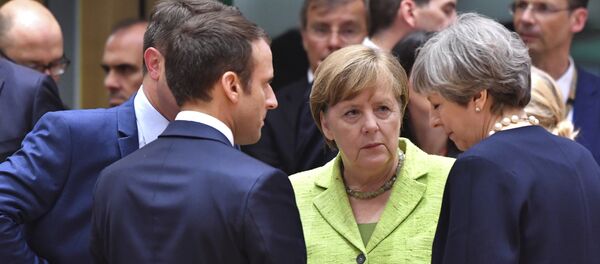Sputnik: What do you make of Netanyahu’s visit to Europe so far?
Ronen Zeidel: Israel was very satisfied with the American withdrawal from the Iranian nuclear deal. As long as the Europeans still comply with the deal, the deal is still valid. Israel is actually trying to work closer with the Europeans so that sanctions on Iran would be stiffened, because as long as the Europeans still comply with the deal, they don’t comply with the sanctions. It’s only American sanctions and the threat of American sanctions that affect other parties and Israel would like to stiffen the sanctions on Iran by convincing the Europeans. I also believe that this was not the only item on the agenda, because speaking about Iran, he was probably also referring to the situation in Syria and other items.
Ronen Zeidel: Very limited, very limited. Of course the Americans and the Europeans aren’t broadcasting on the same waves, as we say, and in his meeting with Macron he was also reminded of the situation in Gaza and the security situation in the territories. The meeting with Macron was half-friendly, half-critical. I’m not so sure about the meeting with Merkel, she was probably more cautious when speaking with Israeli politicians. But I believe he wasn’t so successful in getting the European withdrawal and compliance with the American withdrawal from the Iranian nuclear deal.
READ MORE: Macron's 90 Minutes With Netanyahu: France Shares Israel's Concern About Iran
Sputnik: Can we anticipate anything different from the meeting with Theresa May?
Ronen Zeidel: Not that I really know about that. I can hardly see anything about this meeting and I believe that Netanyahu wouldn’t change an already existing decision by the British Government on Iran.
Ronen Zeidel: No, I don’t believe there were high hopes for a breakthrough from the Israeli side from these meetings. Because the Americans have already decided to withdraw, they wanted to get the Europeans closer to the American position and stiffen sanctions on Iran. Because Israel understands that the agreement is still valid as long as the Europeans and the rest of the world, of course, are complying with it.
READ MORE: 'Terror State' vs 'Democracy': Pro & Anti-Netanyahu Protesters Speak to Sputnik
Sputnik: After the meeting with German Chancellor Angela Merkel she did say that she admitted that Iran represents a threat to Israel’s security. Do you think that’s anything significant and can we expect anything to come of that?
Ronen Zeidel: I don’t think that anything commercial or economical would come from what Angela Merkel says. I believe that the Europeans treat the new Iranian nuclear threat very seriously and believe that the right way to curb it and stop it is by complying with the nuclear agreement. They believe that this was the best deal. The current American administration believes in different things and in different ways to make the Iranians stop their nuclear project and Israel is siding with the American administration and so far the American administration has been very pro-Israeli, maybe overly pro-Israeli. But as far as the Europeans are concerned, I think that they still continue with their own particular way to stop the Iranian nuclear project. They believe that the nuclear project of Iran is a serious matter and it not only concerns Israel, it concerns some other countries in the region and it’s a serious matter, but they believe in a different way of solving it.
Sputnik: Ant it’s also interesting to know that while Netanyahu is lobbying various European leaders to impose additional sanctions and pull out of the JCPOA, we have Iran, which is reacting and the reaction so far has been “we’re going to up our production of enriched uranium.” What kind of reaction has there been in Israel regarding that and is this not perceived as a direct response to the pressure put on Donald Trump and the decision by Donald Trump to pull out of the agreement? Because they had the option to increase their uranium enrichment prior to this and they didn’t do it and now they are.
The views and opinions expressed in this article by Ronen Zeidel are those of the speaker and do not necessarily reflect Sputnik's position.






